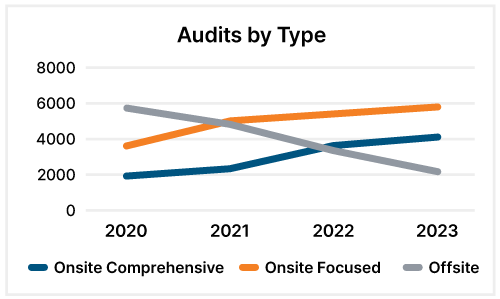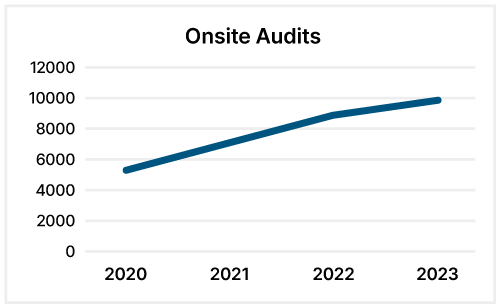Sr. Transportation Safety Editor — J. J. Keller & Associates, Inc.
2023 FMCSA Audits Year in Review: It’s Tough Out There!
FMCSA and its state partners conducted more than 12,300 investigations in 2023 and continued its shift to more on-site audits, up 13% over 2022.
Published On: 05/10/2024


Written by:
Daren Hansen
For the third year in a row, more DOT audits are being performed on-site. As a result, investigators are finding more serious violations and issuing more penalties than in years past. Are you prepared for an auditor’s knock on your door?
The Federal Motor Carrier Safety Administration (FMCSA) relied heavily on off-site audits during the peak of the pandemic, performing more than half of its audits remotely. Last year saw a continued shift towards getting auditors back out into the field, where fully 80 percent of audits were performed.
Odds Are, You Have Violations
Why is the location of an audit important? On-site audits bring much more scrutiny — more interviews conducted, more documents reviewed, more vehicles inspected — so it’s no surprise they’re uncovering twice as many acute violations (the most serious kind) than they did just a few years ago.
If you think you’re too small for an audit or would survive one unscathed, consider this: fully 94 percent of audits resulted in violations last year, and over half (54 percent) were of companies with fewer than 7 power units. About 97 percent of those audited had 100 or fewer units.
If you’re not quite ready for that knock on the door, it’s time to get prepared for a DOT investigation of your compliance program, especially your documentation.
Comprehensive Audits Up 13%
In 2023, the FMCSA and its state partners performed over 12,300 investigations, down slightly from 2022 but the decline was limited to off-site audits. The total included roughly:
- 4,100 on-site comprehensive audits (up 13%)
- 5,800 on-site focused reviews (up 8%)
- 2,200 off-site audits (down 34%)
Complete Records are Vital
The state of your documentation will make or break your audit results, and meticulous recordkeeping has never been more important.
If you’re unsure where to begin preparing for an audit, getting your DOT-mandated paperwork in good shape is a great place to start. About 65 percent of all critical violations found during audits last year related to recordkeeping, including 7 out of the top 10.
Why does it matter? Consider a favorite target: false logs. If an auditor discovers that just 10 percent of your drivers’ logs are falsified, the best you can hope for is a Conditional safety rating. If additional violations are found, you could easily face an out-of-service order.


A comprehensive, on-site audit is the most intensive, potentially taking several days and involving an in-depth document review, interviews, and inspections covering all aspects of a motor carrier’s operations. An off-site audit involves a review of documents sent to the auditor, making it less stressful and intrusive.
Nearly half of audits in 2023 were “on-site focused,” where the auditor comes on-site and targets a specific safety problem, such as hours of service (HOS) or driver files, typically as a result of poor Compliance, Safety, Accountability (CSA) scores.
More Serious Violations, More Conditional Ratings
As noted, an increase in on-site audits means more serious violations are being found and higher penalties are being paid. Last year saw a 5-percent increase in investigations that led to either acute or critical violations, the types that can impact your safety rating. As a result, there was an uptick in carriers that received a Conditional safety rating last year.
More than 1 in 4 audits resulted in a fine, and both fine amounts and the number of enforcement cases ticked upward in 2023. When fines are levied, they are higher than ever — the maximum fines allowed by law are tied to inflation and have increased by 17 percent over the past three years.
2023 By the Numbers
- 94% of audits resulted in at least one violation
- 26% resulted in fines or other penalties
- 3,830 enforcement cases were finalized (up 6%)
- $26,700,000 in fines were collected (up 4%)
- $7,000 was paid per settlement, on average (up 2%)
- 52% of audits resulted in acute or critical violations (up from 47%)
- 32% of audits resulted in critical violations (up from 30%)
- 20% of audits resulted in acute violations (up from 17% and double the percentage from 2020)
- 35% of audits resulted in a less-than-satisfactory safety rating
- 29% were Conditional (up from 28%)
- 6% were Unsatisfactory (no change)
Audits are not only hitting motor carriers’ bottom lines; they’re having long-range impacts since less-than-satisfactory safety ratings can lead to lost business, higher insurance rates, and increased liability in court.
Top 5 FMCSA fines of 2023
- $426,210 — Violating OOS order, denying access, HM violations, false logs
- $160,000 — HM violations
- $135,390 — Random drug testing & CDL violations
- $126,960 — Driver qualification violations
- $111,410 — Log falsification & vehicle maintenance violations
Complete Records are Vital
The state of your documentation will make or break your audit results, and meticulous recordkeeping has never been more important.
If you’re unsure where to begin preparing for an audit, getting your DOT-mandated paperwork in good shape is a great place to start. About 65 percent of all critical violations found during audits last year related to recordkeeping, including 7 out of the top 10.
Why does it matter? Consider a favorite target: false logs. If an auditor discovers that just 10 percent of your drivers’ logs are falsified, the best you can hope for is a Conditional safety rating. If additional violations are found, you could easily face an out-of-service order.
Top 10 audit violations of 2023 that could affect your safety rating*
- Failing to follow local laws and regulations (§392.2)
- Falsifying records of duty status
- Not using the right method to record hours
- Using a driver before getting pre-employment drug test results
- Violating the 14-hour on-duty limit
- Failing to keep initial MVRs
- Failing to inspect vehicles annually
- Violating the 11-hour driving limit
- Driving with a suspended/revoked CDL
- Failing to keep driver qualification files
*These are the most commonly found "acute" and "critical" regulations, which are the ones used to calculate safety ratings.
Where to Focus Your Efforts
Today, digital records management is expected. No matter what type of audit you might face, you may be asked to submit records electronically on short notice. If you can’t, you’ll be at a disadvantage.
The more organized and digitized your DOT records are, the easier you can spot problems before an auditor does, and the quicker an audit can conclude.
First, focus your efforts on your driver qualification, drug/alcohol testing, HOS, and vehicle inspection/maintenance files — most acute and critical regulations fall into those areas. Be aware that you’ll also be asked for proof of insurance, an accident register, and possibly many other compliance documents.
In many cases, documentation may be your only proof of compliance. Fail to create a record or toss it out too soon, and you may be hit with a penalty. An electronic records management system will alert you to missing or non-compliant records so you can fix the problems before they result in a fine.
The FMCSA’s audit results from 2023 are a call to action to prioritize and enhance your DOT recordkeeping and compliance efforts. Don’t wait for that knock on the door or notice in the mail. Surviving an audit depends on a robust, organized recordkeeping system, like J. J. Keller® Encompass® Fleet Management Platform, and proactive safety management practices.
You may also enjoy the following articles:
Sign up for our newsletter!
We'll help you stay on top of regulations, best practices, and fleet industry news. Sign up to receive a monthly email notification with links to our most recent blog articles, free resources, and event invites.
